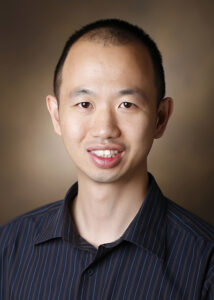�鶹��ý University’s new brings computer science, engineering and biomedical researchers together with clinicians at �鶹��ý University Medical Center to accelerate discovery related to human diseases and conditions.
Launched in mid-January, the center will analyze extensive data generated through new technologies to find innovative solutions to complex questions about human biological systems. It is housed within the School of Medicine Basic Sciences; , is its director.

Lau’s work, which focuses on technologies for cellular profiling and mining data for new insights, has led to key discoveries in inflammatory bowel disease and colorectal cancer. He publicly shares his data, software and analysis protocols to benefit the biomedical research community, with the goal of contributing to a new era of open science.
“There’s so much data now in the public domain, not just for today’s researchers but for the next generation of scientists. It is necessary for trainees to develop skills in computational systems biology to leverage these valuable resources for making discoveries that can translate into benefits for human health,” Lau said.
The Office of the Provost provided funding for the CCSB as a part of the —a dedicated effort to increase faculty, student and staff engagement and success in pursuing bold new ideas through disciplined, rigorous inquiry.
“The Center for Computational Systems Biology builds on �鶹��ý’s strengths in biomedical research and leverages advanced computing to drive innovation,” said. “Under Professor Lau’s leadership, it will become a hub for discovery, tackling challenges in disease prevention, diagnosis and treatment to transform lives and improve global health.”

“Professor Lau’s scholarship and leadership in federally funded research programs make him a natural fit to direct the CCSB at �鶹��ý University,” said , dean of the School of Medicine Basic Sciences. “He is an exceptionally talented systems biologist, and this Discovery �鶹��ý center designation will allow him to take his research to the next level, with implications for how biomedical researchers and physicians treat disease.”
Lau earned a Ph.D. in bioinformatics and proteomics from the University of Toronto and did postdoctoral training at Harvard/MIT before joining the �鶹��ý faculty in 2013. To develop an understanding of how the body works, take a systems-level approach—an engineering concept—to build models that illustrate the interactions happening in cells and tissues.
“Computation plays a key role in this approach. We used to build models of how these biological systems work by only knowing a few components and then estimating how they interact with each other,” Lau said. “Now, we can actually measure these interactions simultaneously and in large scale. Computational approaches are critical to turning these big data into insight. We can essentially have the computer learn the model from the data without us having to build one from scratch.”
The work conducted by Lau and his team focuses on biological processes of the digestive system and how cells transition into precancerous states. from the National Cancer Institute to build a molecular atlas of colorectal cancer, and he had that lays the groundwork for understanding and predicting the natural transition between precancers and cancer.
Launching with about 20 members, the CCSB is just the latest effort by �鶹��ý to nurture a discovery ecosystem that realizes the full potential of the rapid advances happening in computer science, artificial intelligence and data science. In 2018, the university established the Data Science Institute to promote collaborative, interdisciplinary data-driven research. The College of Connected Computing, announced last year, is recruiting faculty and seeking its first dean.

At the launch of the CCC, discussed the importance of these developing disciplines to the university’s research enterprise.
“Of all the factors shaping society, few are more influential than the rapid emergence of advanced computing, AI and data science,” he said. “Our aim is to make �鶹��ý a global leader in these fields, ensuring our continued academic excellence and capacity for world-changing innovation.”
The has a rich history in biomedical research and a solid resource base to launch the CCSB. With its available infrastructure and its proximity to a major medical center with nationally ranked treatment centers, the Center for Computational Systems Biology is well positioned to expand rapidly and accelerate discovery.
